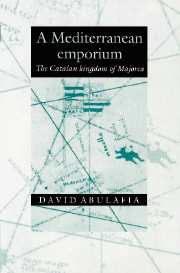Book contents
- Frontmatter
- Contents
- Preface
- Note on nomenclature
- List of the kings of Majorca, 1229–1343
- Note on the coinage of the kingdom of Majorca
- Map 1 The kingdom of Majorca
- Map 2 The western Mediterranean
- PART I UNITY AND DIVERSITY
- PART II THE CROSSROADS OF THE MEDITERRANEAN
- 6 The rise of the trade of Mallorca City
- 7 Commerce in the age of the Vespers
- 8 Towards economic integration: the early fourteenth century
- 9 The trade of the autonomous kingdom in its last two decades
- 10 From the Mediterranean to the Atlantic
- 11 The reshaping of Mallorca's economy, 1343–1500
- Conclusion
- Appendices
- Bibliography
- Index
11 - The reshaping of Mallorca's economy, 1343–1500
Published online by Cambridge University Press: 05 October 2010
- Frontmatter
- Contents
- Preface
- Note on nomenclature
- List of the kings of Majorca, 1229–1343
- Note on the coinage of the kingdom of Majorca
- Map 1 The kingdom of Majorca
- Map 2 The western Mediterranean
- PART I UNITY AND DIVERSITY
- PART II THE CROSSROADS OF THE MEDITERRANEAN
- 6 The rise of the trade of Mallorca City
- 7 Commerce in the age of the Vespers
- 8 Towards economic integration: the early fourteenth century
- 9 The trade of the autonomous kingdom in its last two decades
- 10 From the Mediterranean to the Atlantic
- 11 The reshaping of Mallorca's economy, 1343–1500
- Conclusion
- Appendices
- Bibliography
- Index
Summary
The century after the final reincorporation of the kingdom of Majorca into the lands of the Crown of Aragon (1343) saw the economy of Mallorca, Menorca and Ibiza develop in new directions. The question that must be posed at the outset is whether it was the change in political régime or the economic crisis induced by the Black Death that engendered these changes. Predictably, the answer is a bit of each, to which must be added a widely observable European phenomenon at this period: new initiatives which had begun to succeed on the eve of the Black Death often succeeded even better in the more diversified economy that developed in late fourteenthcentury western Europe; a classic Spanish example is the expansion of the Mesta and of wool exports out of Castile. It will be seen that Menorca is another good example. High labour costs and the ready availability of land encouraged the expansion of pastoral activity throughout much of Europe.
The first point to stress is that its good position on the international trade routes, combined with the growing difficulties of woollen-cloth producers in Flanders and Florence, gave new life to the Mallorcan textile industry. It is now clear that this industry took several decades to rival that of Barcelona; Antoni Riera Melis has written of ‘el lento despertar de la manufactura lanera en Mallorca’.
- Type
- Chapter
- Information
- A Mediterranean EmporiumThe Catalan Kingdom of Majorca, pp. 216 - 231Publisher: Cambridge University PressPrint publication year: 1994



